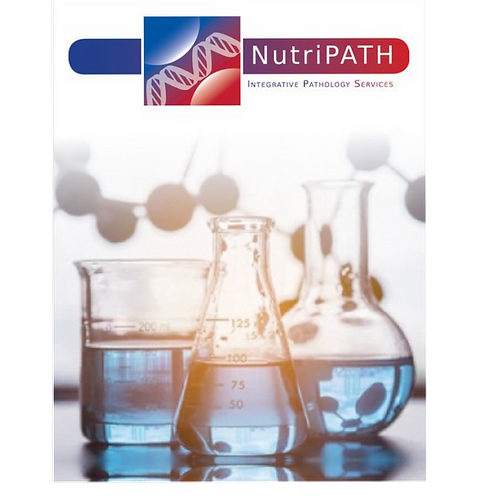

Complete Microbiome Mapping (CMM)
Method - Stool
Take your sample in the comfort of your own home and send via pre-paid courier to the lab.
Test Results
2-3 weeks
Sample Report
Items tested
Analytes
Macroscopic markers
-
Stool colour
-
Stool form
-
Mucous
-
Blood
Functional & inflammatory markers
-
Calprotectin
-
Pancreatic Elastase
-
Faecal Secretory IgA
-
Faecal Zonulin
-
Faecal B-Glucuronidase
-
Steatocrit
-
anti-Gliadin IgA
Parasites
-
Cryptosporidium
-
Entamoeba histolytica
-
Giardia lamblia
-
Blastocystis hominis
-
Dientamoeba fragilis
-
Endolimax nana
-
Entamoeb coli
-
Pentatrichomonas hominis
Worms
-
Ancylostoma duodenale, Roundworm
-
Ascaris lumbricoides, Roundworm
-
Necator americanus, Hookworm
-
Trichuris trichiura, Whipworm
-
Taenia species, Tapeworm
-
Enterobius vermicularis,Pinworm
Bacteria
-
Bacillus species
-
Enterococcus faecalis
-
Enterococcus faecium
-
Morganella species
-
Pseudomonas species
-
Pseudomonas aeruginosa
-
Staphylococcus species
-
Staphylococcus aureus Streptococcus species
-
Methanobacteriaceae
-
Desulfovibrio piger
-
Oxalobacter formigenes
Potential auto-immune triggers
-
Citrobacter species
-
Citrobacter freundii
-
Klebsiella species
-
Klebsiella pneumoniae
-
Prevotella copri
-
Proteus species
-
Proteus mirabilis
-
Fusobacterium species
Fungi & Yeast
-
Candida species
-
Candida albicans
-
Geotrichum species
-
Microsporidium species
-
Rhodotorula species
Bacterial pathogens (harmful infectious bacteria)
-
Aeromonas species
-
Campylobacter.
-
C. difficile, Toxin A
C. difficile, Toxin B -
Enterohemorrhagic E. coli
-
E. coli O157
-
Enteroinvasive E. coli/Shigella
-
Enterotoxigenic E. coli LT/ST
-
Shiga-like Toxin E. coli stx1
-
Shiga-like Toxin E. coli stx2
-
Salmonella
-
Vibrio cholerae
-
Yersinia enterocolitica
-
Helicobacter pylori
Viral pathogens (harmful viruses)
-
Adenovirus 40/41
-
Norovirus GI/II
-
Bocavirus
Beneficial gut bacteria (probiotics)
-
Bacteroides fragilis
-
Bifidobacterium species
-
Bifidobacterium longum
-
Enterococcus species
-
Escherichia species
-
Lactobacillus species
-
Lactobacillus Rhamnosus
-
Clostridium species
-
Enterobacter species
-
Akkermansia muciniphila
-
Faecalibacterium prausnitzii
Short chain fatty acids
-
Short Chain Fatty Acids, Beneficial
-
Butyrate
-
Acetate
-
Propionate
-
Valerate
View the Complete Microbiome Mapping sample test report here.

.jpeg)
.jpeg)
The Complete Microbiome Map is an advanced non-invasive diagnostic tool for assessing gastrointestinal function. As the CMM combines a large number of tests that assess the function of the GUT (gastrointestinal tract), a comprehensive picture of your gut health will be formed.
The analysis investigates digestion, metabolism, absorption and metabolic markers, pancreatic function, the balance of beneficial bacteria and the presence of harmful bacteria, yeast and parasites & worms.
Symptoms & Conditions Associated with Abnormal Gut Function
-
Abdominal pain
-
Autism
-
Bad breath
-
Bloating
-
Brain fog
-
Chemical sensitivities
-
Coeliac’s disease
-
Constipation
-
Depression
-
Diarrhoea
-
Fatigue
-
Food allergies and sensitivities
-
Gastrointestinal cancers
-
Headaches
-
Inflammatory bowel disease
-
Irritable bowel syndrome
-
Maldigestion
-
Mood imbalances
-
Multiple sclerosis
-
Rheumatoid arthritis
-
Schizophrenia
-
Skin conditions
-
Ulcers
-
Weight loss
Gastrointestinal Health
The gastrointestinal tract (GI tract) has three main functions:
-
To digest and absorb important nutrients for the healthy growth, cell repair and function
-
To act as a barrier to keep harmful substances, antigens and microorganisms from entering the blood
-
Elimination of waste products and toxins
The GI tract influences not only GI health. It is also known as the ‘second brain’ and affects the entire body.
Within the gastrointestinal tract more than 500 different bacterial species, in excess of 10 organisms per gram of wet weight, can be detected. These bacteria also play a key role in digestion, nutrition, pathogen defence and immune system development. When the function and interplay within this complex system is disturbed, ill-health can easily develop.
Multiple areas can influence this fine balance including digestion, absorption, the location, number and specific species of bacteria, parasitic infection, as well as epithelial integrity (lining of the gut) and inflammation.
Symptoms
Typical symptoms on why we order this test;
-
Diarrhoea
-
Blood in the stool
-
Mucus in the stool
-
Constipation
-
Bloating
-
Bad breath
-
Abdominal pain
-
Anaemia
-
Food sensitivities
-
Osteoporosis
However, other conditions not typically recognised, but associated with gastrointestinal health, include;
-
Chronic fatigue
-
Depression
-
Autism
-
Arthritis
-
Autoimmune disorders.
These conditions may result from ‘leaky gut’ and the subsequent exposure to foreign particles which may trigger local and systemic immune and inflammatory issues.
To book your consultation, click here.
